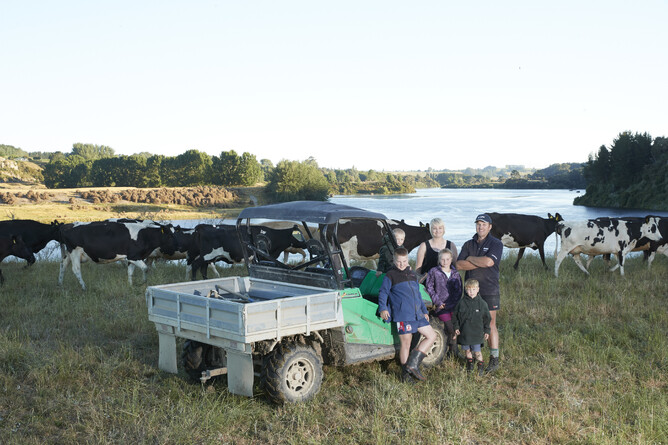Simon and Elle Clarke farm on 307 hectares at Hora Hora, near Cambridge, in the Waikato.
The Clarkes are in their fourth season at the farm, where they milk 480 dairy cows including 100 autumn calvers, 100 calves and 100 heifers. They average about 190,000kg/MS off the 480 cows a year.
It’s a beautiful place to live and work, located near Lake Karapiro, in the shadow of Mt Maungatautari.
The four Clarke children – Toby, 11; Hayley, 9; Harrison, 5; and Blake, 3 – love the farm lifestyle.
As well as growing their family, the Clarkes are dedicated to growing their herd of dairy cattle.
“I’m trying to breed a good herd of dairy cows that are healthy and efficient and put milk in the vat,” says Simon. “That means good udder capacity, and good general traits.”
They farm a mix of Friesian or Friesian-cross (80 per cent Friesian genetics) on 280 effective hectares of farmland. Some of the land includes river flat and steep country. They bred cows to suit their farm environment. “Stature is a big thing – we have a lot of steep country here so that suits a medium-sized cow better,” says Simon.
“I’m still in the shed every day so I also pay attention to a cow’s temperament. I want to milk a cow that not only has nice udders and is nice to look at, but is easy to work with.”
The Clarkes rely on CRV Ambreed to improve the genetics and traits of their herd.
“I’ve been with CRV Ambreed since I first started share-milking, when I was 22,” says Simon. “That’s 15 or 16 years I have been with CRV. I like their breeding philosophy and the type of cow they are chasing.”
Simon says he enjoys working with CRV Ambreed, not only for their world-class genetics, but for their customer service. “They have good, honest, reliable people working there and I think that’s a strength. They are very knowledgeable. They get to know where you are at, and who you are.”
He’s worked closely with CRV Ambreed field consultant Bill McLean who’s also a regional sales manager, and more recently Brett Andrews who is a field consultant for Cambridge, Tokoroa, Putaruru and Arapuni. “He’s had a lot to do with developing our philosophy and looking at how we can improve our cows.”
Longevity is important, and Simon doesn’t cull cows based on age alone. “There are some cows who I should technically get rid of, if I was going by age, but their udders are good, their feet are good, they are still milking well, so I keep them in the herd. Longevity is something I breed for,” says Simon.
“I don’t focus on breeding worth (BW), I focus on a nice, healthy, solid cow with good traits and efficiency. In my opinion there is too much focus on BW. However, a lot of people out there do want the CRV Ambreed type of animal.”
Each year the Clarkes also nominate bulls, and Simon says being able to handpick which bulls mate with which cows means he can ensure a consistent herd – in terms of feed, udders and size of animal – over time.
Simon grew up in a farming family, and is proud to the contributing to improving New Zealand’s dairy herd by focusing on using science and planning.
The Clarke family feature on the front cover of the new 2018 CRV Ambreed catalogue, released in late March. “It was good fun, taking photos with the family down by Lake Karapiro,” laughs Simon. “Farming for us is a family affair, and my wife and children help out a lot on the farm, so it was really nice to be featured on the catalogue together.”
CRV Ambreed Sales and Marketing Manager Mathew Macfie says the Clarkes are excellent examples of farmers leading the way for the dairy industry in their philosophy and practices. “They live the CRV Ambreed values of ‘better cow, better life’ in all they do, and we are proud to be part of what they are trying to achieve on their farm,” he says.
“Their cows are a good example of how breeding healthier, more efficient cows helps improve the farm business over time. It’s about having a long-term vision.”
He says the Clarkes’ approach to breeding is typical of farmers CRV Ambreed is dealing with. The company recently started promoting its Better Life Health and Better Life Efficiency indexes to help farmers achieve a holistic approach to building their herds. The new style of index for sire selection has been brought in as a response to the changing needs of the New Zealand dairy industry.
For more information visit www.crv4all.co.nz

